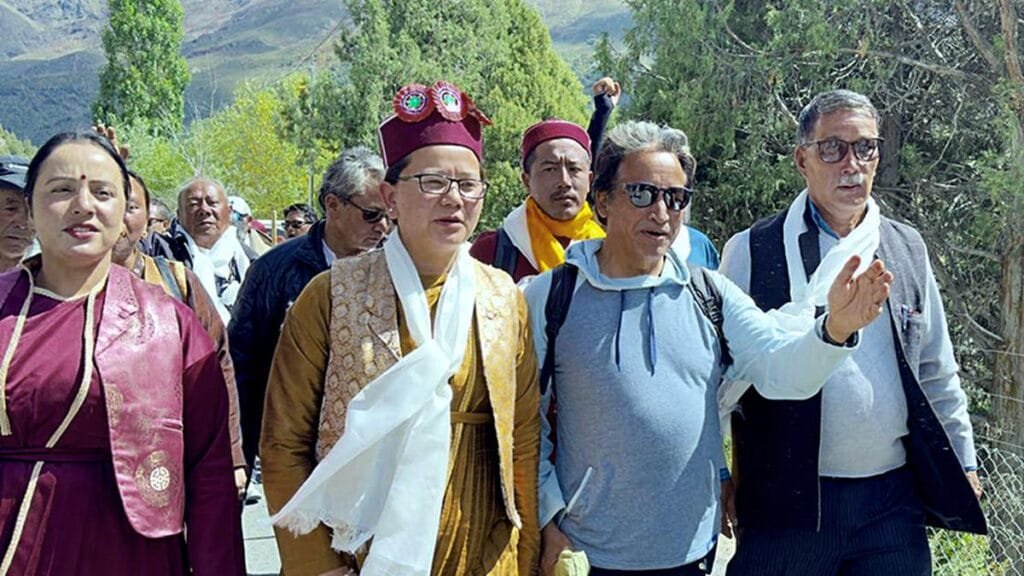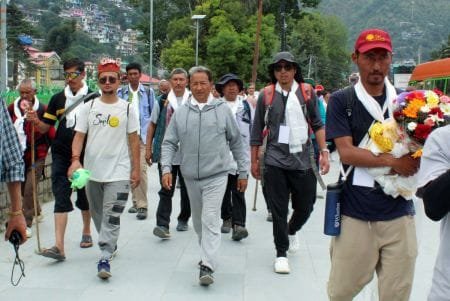Key Highlights:
Popular Ladakhi activist and engineer Sonam Wangchuk, along with over 120 others, was detained by Delhi Police at the Delhi border on October 1st, 2024, when exercising their right to protest for the rights of the Union Territory of Ladakh as granted under the Sixth Schedule. The current development has thus brought national attention to the struggle of autonomy and Ladakh’s cultural identity.
The call for Sixth Schedule Rights in Ladakh
The Sixth Schedule in the Indian Constitution provides for autonomous provisions of the administrative areas of the northeast states with the objective of safeguarding the cultural identities, resources, and socio-economic development in tribal communities. The demand of Ladakh comes under this schedule, which is deeply rooted in the concern towards protecting a fragile environment, special culture, and land rights after the abrogation of Article 370 and bifurcation of Jammu and Kashmir in 2019.

Activists and local leaders assert that Sixth Schedule rights would ensure the vested interest of the indigenous people of Ladakh by ensuring autonomy over their affairs. This way, land and employment opportunities would be retained within the community, preventing exploitation and thus preserving Ladakh’s rich heritage.
Sonam Wangchuk in the Movement
Sonam Wangchuk is an engineer and innovator from Ladakh who works towards sustainable development in the Himalayan regions. He was widely recognized for his work as an education and sustainable technology innovator and apparently inspired the character Phunsukh Wangdu in the Bollywood film “3 Idiots.”

Indeed, the participation of Wangchuk in the protest is an indicator of how serious the matters are going on in Ladakh. His indefinite fast and demand for Sixth Schedule rights fell in the ears and hearts of many Ladakhis as well as supporters throughout the nation. Wangchuk, through this movement, seems to draw attention to the urgent need for legal and constitutional protection given to Ladakh’s distinct way of life, which he believes was getting threatened by uncontrolled development and governmental policies.
Detention of Protesters:
Is It a Suffocating Democratic Voice? Delhi Police detained more than 120 protesters and Wangchuk, raising the issue of the right to peaceful assembly and democratic expression. Protesters were reportedly detained at the border in Delhi before they could reach the spot where they wanted to protest in the nation’s capital, Jantar Mantar.
According to police officials, the cause for detention was a lack of proper permissions for protest, but the critics relate this to an attempt at silencing voices critical or against government policy. The incident raises a multitude of questions over the right to dissent in a democratic society, raising questions over the issue of causing harm to the environment and the livelihood of the marginalized communities.
Broader Implications for Ladakh and India
Ladakh’s demand for Sixth Schedule rights, therefore, is not only a question of local autonomy but it has a more profound concern regarding the degradation of the environment due to unsustainable tourism and the threat of possible external influences that could dramatically alter the demographic and cultural face of the region. Ladakh is strategically important and ecologically sensitive, and people fear that free commercialization without adequate protection could take things too far.
The people of Ladakh are fighting for Sixth Schedule rights and sustainable, inclusive, and respectful development under their unique cultural identity. The movement has seen the support of a whole gamut of people from environmentalists to tribal rights activists to political leaders as they feel that this is an important step of India’s protection of its diversified and fragile ecosystems .
Political Reactions and the Road Ahead
The detention of Sonam Wangchuk and other protesters has won much outry among politicians, activists, and civil society groups. Many politicians are asking the government to engage in dialogue with the Ladakhi leaders and take action according to their demands, which also include constitutional protection.
The incident rightfully reflects a balanced approach to development with due respect for the aspirations and rights of indigenous communities and considerations for national interests. For Ladakh, it stands for the struggle for Sixth Schedule rights as part of the larger struggle for recognition and greater autonomy for sustainable progress in times of change.
Conclusion
Detention of Sonam Wangchuk along with more than 120 protesters made Ladakh’s Sixth Schedule rights demand reach a wider level, or should I say it brought questions about democratic freedoms, indigenous rights, and sustainable development in India onto the larger table? Will Ladakh get the boon of greater autonomy along with protection of its unique heritage and environment, that will be seen, and in a very close future at that.
For Latest News Updates Click Here
